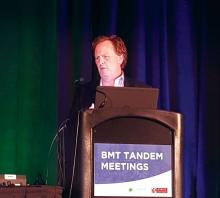SNP rs7958311, which had increased surface expression, was associated with a trend toward increased relapse risk (P = .053), and the loss-of-function SNP rs1653624 was associated with an excess of early transplant-related mortality (P = .0471).
“Individual SNPs are interesting, but perhaps more interesting are the haplotypes,” Dr. Ritchie said.
Haplotype 2, which was found in 46 of the 333 allogeneic stem cell transplant recipients, involves gain-of-function rs178119 alone.Haplotype 4, which was found in 8 recipients, involves rs1718119 and rs7958311. Those SNPs were previously shown to have 300% and 195% increased expression, respectively, with or without rs2230912, which has been shown to be decreased by 72%, and with or without loss of function rs1653624. Haplotype 4 is associated with a net increase in p2X7 activity, he explained.


